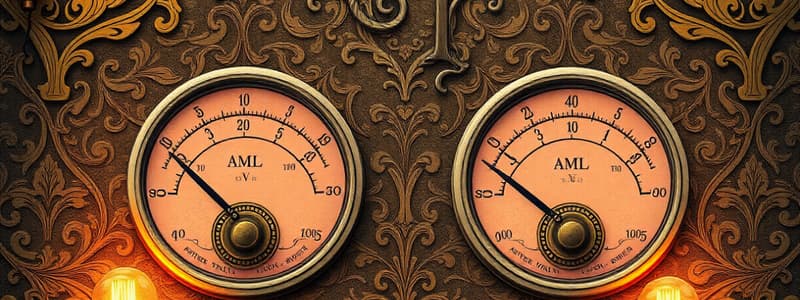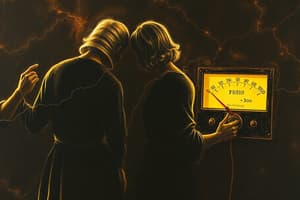Podcast
Questions and Answers
What is the unit for electric current?
What is the unit for electric current?
- Ampere (correct)
- Volt
- Ohm
- Watt
An ammeter can be connected in parallel to measure the current in a circuit.
An ammeter can be connected in parallel to measure the current in a circuit.
False (B)
What happens to a circuit breaker or fuse when too much current passes through it?
What happens to a circuit breaker or fuse when too much current passes through it?
It trips or blows.
The symbol for electric current is represented by the letter ___.
The symbol for electric current is represented by the letter ___.
Match the following current values with their effects on the human body:
Match the following current values with their effects on the human body:
How does electric current flow in a series circuit?
How does electric current flow in a series circuit?
A wall outlet that powers a computer can deliver 10 A.
A wall outlet that powers a computer can deliver 10 A.
What is one main difference between a battery and a cell?
What is one main difference between a battery and a cell?
Too much current can cause a wire to get ___ and potentially cause a fire.
Too much current can cause a wire to get ___ and potentially cause a fire.
What is often referred to as the 'let-go' threshold?
What is often referred to as the 'let-go' threshold?
Flashcards
Electric Current
Electric Current
The rate at which electrons flow past a specific point in a circuit. It's like the amount of water flowing past a point in a river.
Ampere (A)
Ampere (A)
The unit of measurement for electric current. One ampere (A) represents the flow of one coulomb of charge per second.
Ammeter
Ammeter
A device used to measure the electric current flowing through a circuit at a specific point. It needs to be connected in series with the load to measure the current passing through it.
Series Circuit
Series Circuit
Signup and view all the flashcards
Parallel Circuit
Parallel Circuit
Signup and view all the flashcards
Let-Go Threshold
Let-Go Threshold
Signup and view all the flashcards
Circuit Breaker
Circuit Breaker
Signup and view all the flashcards
Fuse
Fuse
Signup and view all the flashcards
Battery
Battery
Signup and view all the flashcards
Cell
Cell
Signup and view all the flashcards
Study Notes
Electric Current
- Electric current is the flow of electrons past a specific point in a circuit
- The rate of electron flow is measured in amperes (A)
- Higher current means more electrons flowing per unit time
- An ammeter measures electric current in a circuit
- Ammeters are connected in series with the load to measure the current flowing through the load
- The symbol for current is I (lowercase)
Measuring Current
- An ammeter is a device used to measure electric current
- An ammeter is represented by an "A" within a circle
- It is connected in series with the load (electrons can only flow in one path)
Safety with Electric Currents
- Very high currents can damage electrical devices and cause fires
- Circuit breakers or fuses in a distribution panel protect circuits from too much current
- Too much current can cause wires to overheat and start fires
- Circuit breakers/fuses trip or blow when there's excessive current, preventing further damage
- This is a safety mechanism to prevent damage by excessive electric current
The Human Body and Electric Shock
- The brain sends electrical signals to muscles through the nervous system
- Even small electrical shocks can be dangerous
- A current of 0.001A can cause a tingling sensation
- Currents between 0.05 and 0.15A can cause muscle contractions
- This threshold is the "let-go" threshold because beyond this, you can no longer let go of the item shocking you
- A current of 1.0 – 4.3A passing through the chest can stop the heart
- A typical wall outlet can deliver 15A
Electricity Questions
- Difference between battery and cell: A battery is made of multiple cells. A cell contains one electrochemical unit.
- Difference between series and parallel circuits: In a series circuit, components are connected end-to-end. In a parallel circuit, components are connected across each other.
- Common circuit type: Typically parallel circuits are used, as they allow electricity to flow through multiple components at the same time.
- Electric current meaning: Flow of electric charge through a conductor
- Ammeter function: Measures electric current.
- Importance of circuit breakers/fuses: Protect a circuit from excessive current which could cause a fire
- How to connect an ammeter: Connect it in series with the load
- Unit for current: Ampere (A)
- Symbol for current: I
- Why electrical shocks are dangerous: Large currents can be harmful, even lethal
- Meaning of "let-go threshold": The amount of current that will cause a person to lose control of an item they're holding
Studying That Suits You
Use AI to generate personalized quizzes and flashcards to suit your learning preferences.
Related Documents
Description
This quiz covers the fundamentals of electric current including its definition, measurement techniques, and safety precautions. Learn about the role of ammeters, the significance of amperes, and how to protect against excessive current in circuits. Test your knowledge on these essential electrical concepts!




